Understanding Contract and Negligence in Business Law (Module 1)
VerifiedAdded on 2019/12/03
|14
|5487
|293
Report
AI Summary
This report examines the core elements of contract and negligence within a business setting. It begins by defining the essential components of a valid contract, including offer, acceptance, intention, and consideration, and then explores different contract types prevalent in the UK, such as face-to-face, written, and online contracts, along with the terms that can be included. The report then analyzes the application of contract elements in business scenarios, including the implications of breach of contract and the legality of exemption clauses. Furthermore, it delves into the principles of liability in negligence, differentiating between contract and tort liability and discussing the concept of 'duty of care' as established in Donoghue v Stevenson, as well as the concept of vicarious liability. Finally, the report applies these principles to real-world situations, providing advice on recovering losses and applying the elements of vicarious liability.
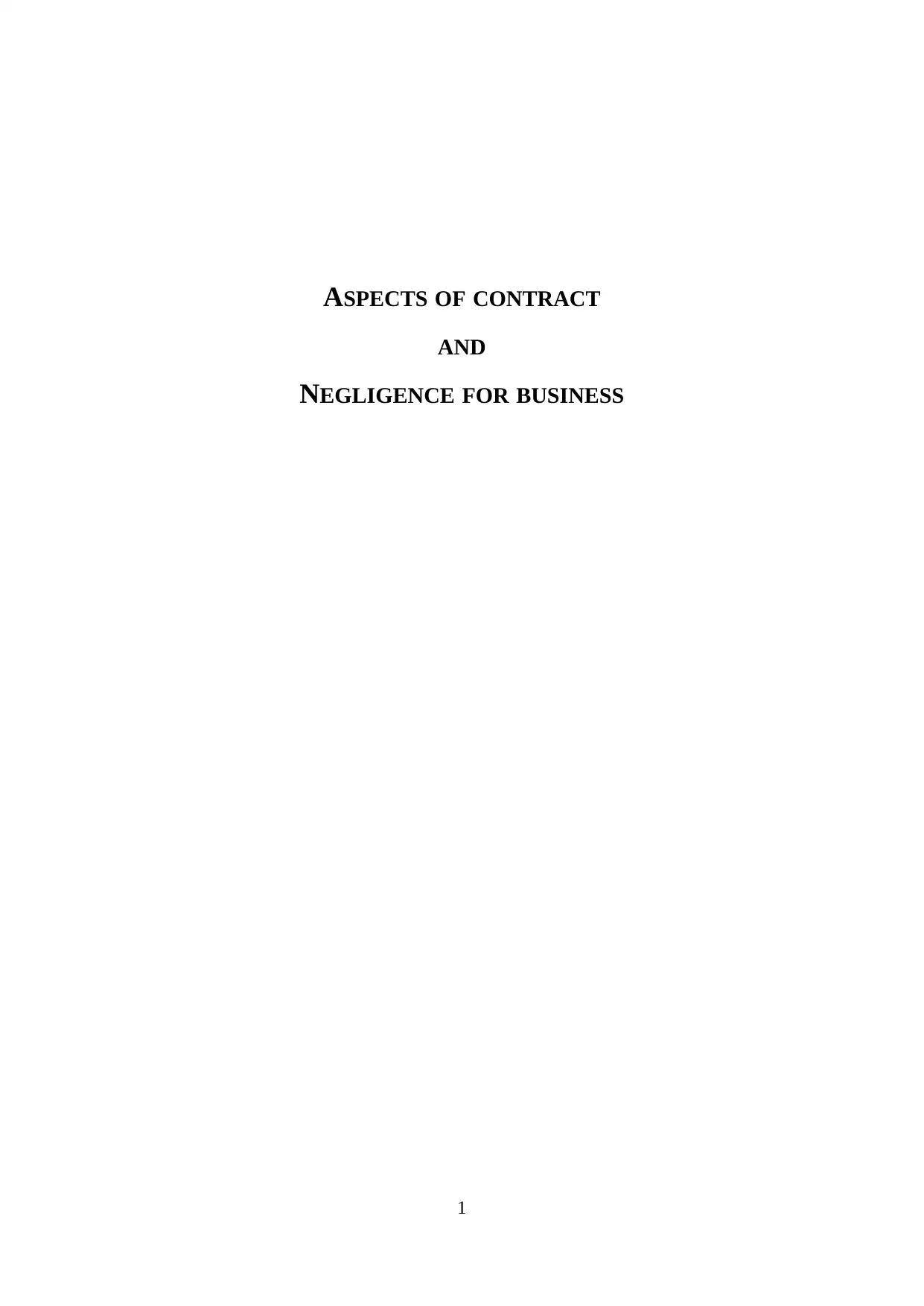
ASPECTS OF CONTRACT
AND
NEGLIGENCE FOR BUSINESS
1
AND
NEGLIGENCE FOR BUSINESS
1
Paraphrase This Document
Need a fresh take? Get an instant paraphrase of this document with our AI Paraphraser
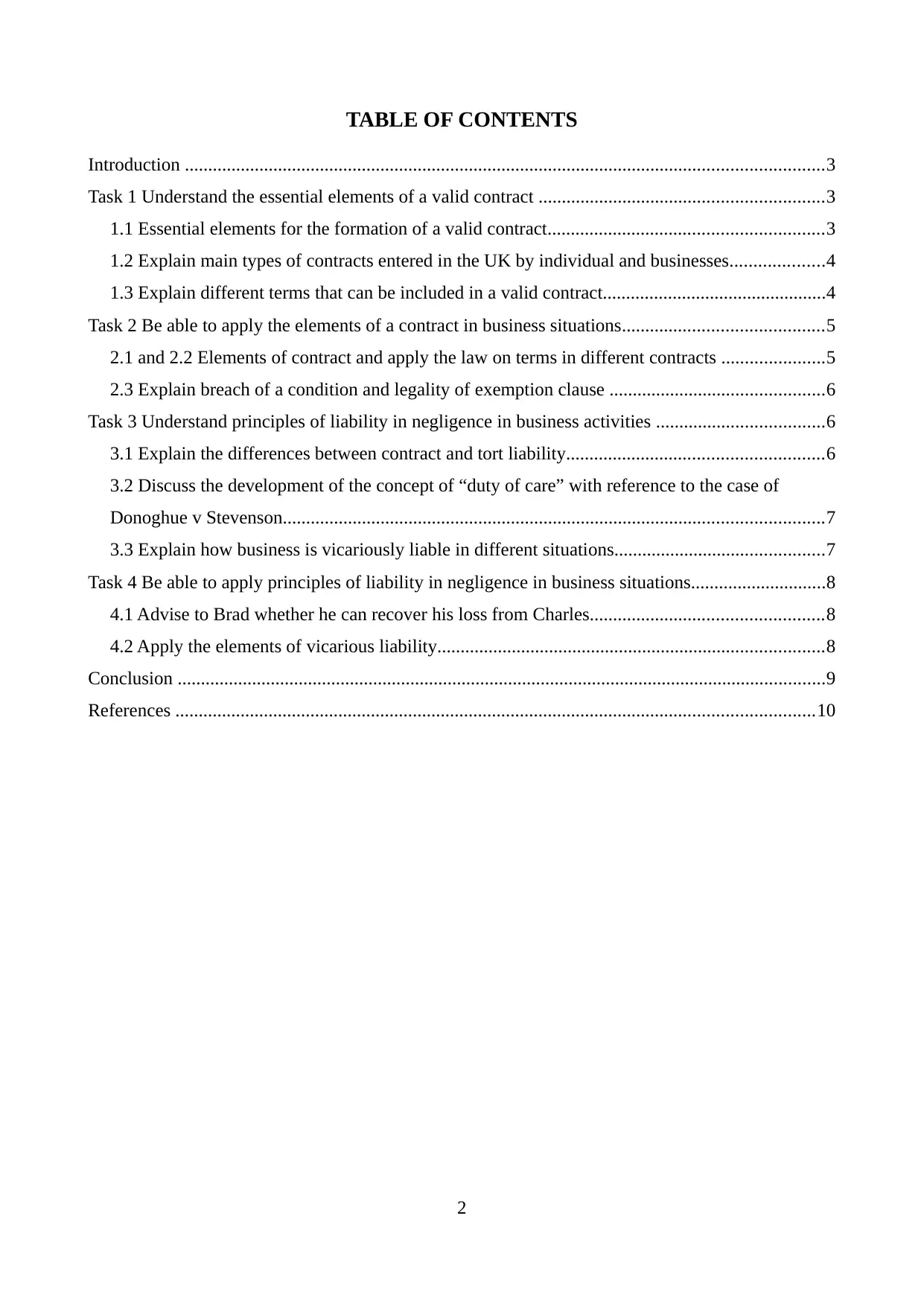
TABLE OF CONTENTS
Introduction .........................................................................................................................................3
Task 1 Understand the essential elements of a valid contract .............................................................3
1.1 Essential elements for the formation of a valid contract...........................................................3
1.2 Explain main types of contracts entered in the UK by individual and businesses....................4
1.3 Explain different terms that can be included in a valid contract................................................4
Task 2 Be able to apply the elements of a contract in business situations...........................................5
2.1 and 2.2 Elements of contract and apply the law on terms in different contracts ......................5
2.3 Explain breach of a condition and legality of exemption clause ..............................................6
Task 3 Understand principles of liability in negligence in business activities ....................................6
3.1 Explain the differences between contract and tort liability.......................................................6
3.2 Discuss the development of the concept of “duty of care” with reference to the case of
Donoghue v Stevenson....................................................................................................................7
3.3 Explain how business is vicariously liable in different situations.............................................7
Task 4 Be able to apply principles of liability in negligence in business situations.............................8
4.1 Advise to Brad whether he can recover his loss from Charles..................................................8
4.2 Apply the elements of vicarious liability...................................................................................8
Conclusion ...........................................................................................................................................9
References .........................................................................................................................................10
2
Introduction .........................................................................................................................................3
Task 1 Understand the essential elements of a valid contract .............................................................3
1.1 Essential elements for the formation of a valid contract...........................................................3
1.2 Explain main types of contracts entered in the UK by individual and businesses....................4
1.3 Explain different terms that can be included in a valid contract................................................4
Task 2 Be able to apply the elements of a contract in business situations...........................................5
2.1 and 2.2 Elements of contract and apply the law on terms in different contracts ......................5
2.3 Explain breach of a condition and legality of exemption clause ..............................................6
Task 3 Understand principles of liability in negligence in business activities ....................................6
3.1 Explain the differences between contract and tort liability.......................................................6
3.2 Discuss the development of the concept of “duty of care” with reference to the case of
Donoghue v Stevenson....................................................................................................................7
3.3 Explain how business is vicariously liable in different situations.............................................7
Task 4 Be able to apply principles of liability in negligence in business situations.............................8
4.1 Advise to Brad whether he can recover his loss from Charles..................................................8
4.2 Apply the elements of vicarious liability...................................................................................8
Conclusion ...........................................................................................................................................9
References .........................................................................................................................................10
2
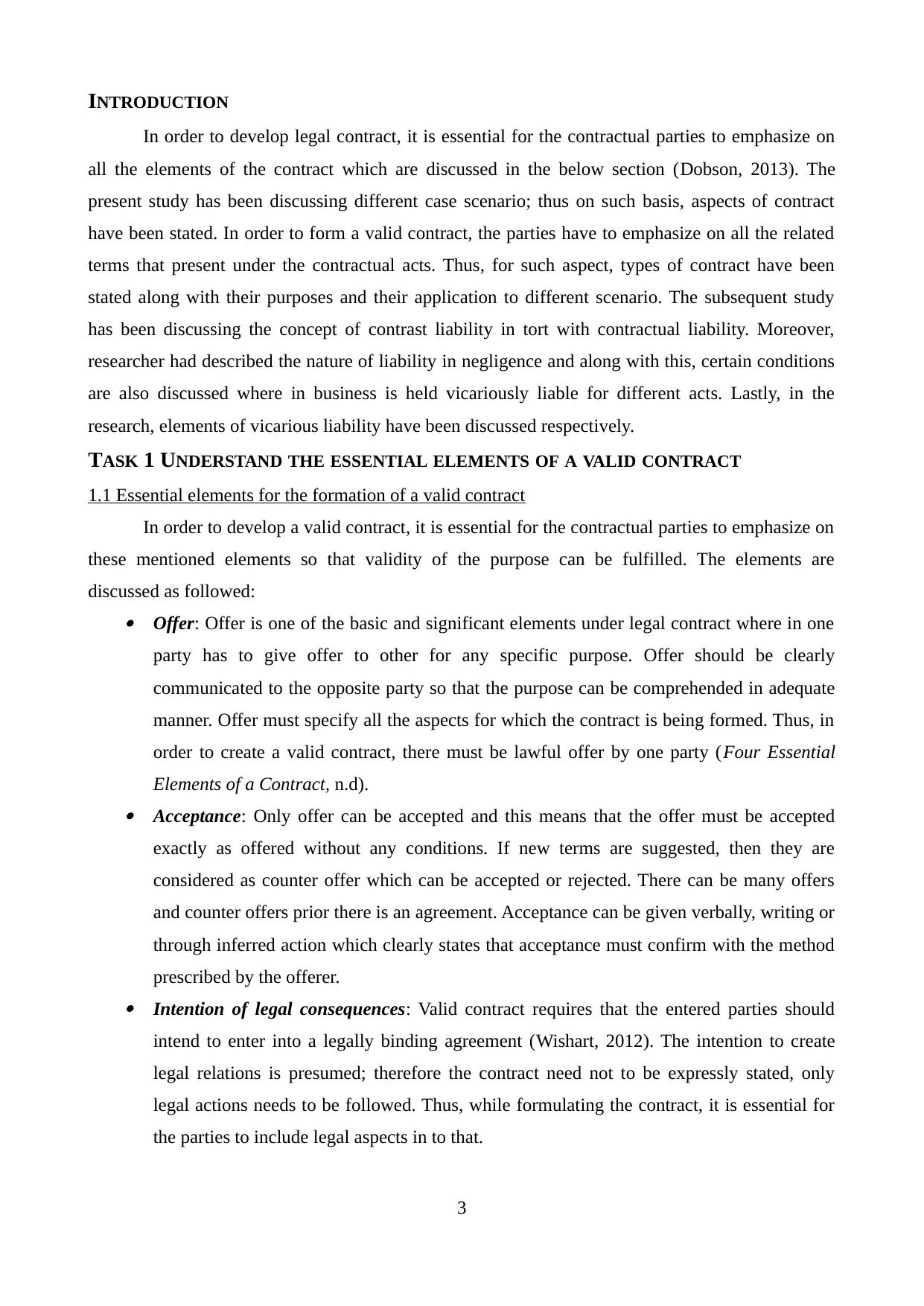
INTRODUCTION
In order to develop legal contract, it is essential for the contractual parties to emphasize on
all the elements of the contract which are discussed in the below section (Dobson, 2013). The
present study has been discussing different case scenario; thus on such basis, aspects of contract
have been stated. In order to form a valid contract, the parties have to emphasize on all the related
terms that present under the contractual acts. Thus, for such aspect, types of contract have been
stated along with their purposes and their application to different scenario. The subsequent study
has been discussing the concept of contrast liability in tort with contractual liability. Moreover,
researcher had described the nature of liability in negligence and along with this, certain conditions
are also discussed where in business is held vicariously liable for different acts. Lastly, in the
research, elements of vicarious liability have been discussed respectively.
TASK 1 UNDERSTAND THE ESSENTIAL ELEMENTS OF A VALID CONTRACT
1.1 Essential elements for the formation of a valid contract
In order to develop a valid contract, it is essential for the contractual parties to emphasize on
these mentioned elements so that validity of the purpose can be fulfilled. The elements are
discussed as followed: Offer: Offer is one of the basic and significant elements under legal contract where in one
party has to give offer to other for any specific purpose. Offer should be clearly
communicated to the opposite party so that the purpose can be comprehended in adequate
manner. Offer must specify all the aspects for which the contract is being formed. Thus, in
order to create a valid contract, there must be lawful offer by one party (Four Essential
Elements of a Contract, n.d). Acceptance: Only offer can be accepted and this means that the offer must be accepted
exactly as offered without any conditions. If new terms are suggested, then they are
considered as counter offer which can be accepted or rejected. There can be many offers
and counter offers prior there is an agreement. Acceptance can be given verbally, writing or
through inferred action which clearly states that acceptance must confirm with the method
prescribed by the offerer. Intention of legal consequences: Valid contract requires that the entered parties should
intend to enter into a legally binding agreement (Wishart, 2012). The intention to create
legal relations is presumed; therefore the contract need not to be expressly stated, only
legal actions needs to be followed. Thus, while formulating the contract, it is essential for
the parties to include legal aspects in to that.
3
In order to develop legal contract, it is essential for the contractual parties to emphasize on
all the elements of the contract which are discussed in the below section (Dobson, 2013). The
present study has been discussing different case scenario; thus on such basis, aspects of contract
have been stated. In order to form a valid contract, the parties have to emphasize on all the related
terms that present under the contractual acts. Thus, for such aspect, types of contract have been
stated along with their purposes and their application to different scenario. The subsequent study
has been discussing the concept of contrast liability in tort with contractual liability. Moreover,
researcher had described the nature of liability in negligence and along with this, certain conditions
are also discussed where in business is held vicariously liable for different acts. Lastly, in the
research, elements of vicarious liability have been discussed respectively.
TASK 1 UNDERSTAND THE ESSENTIAL ELEMENTS OF A VALID CONTRACT
1.1 Essential elements for the formation of a valid contract
In order to develop a valid contract, it is essential for the contractual parties to emphasize on
these mentioned elements so that validity of the purpose can be fulfilled. The elements are
discussed as followed: Offer: Offer is one of the basic and significant elements under legal contract where in one
party has to give offer to other for any specific purpose. Offer should be clearly
communicated to the opposite party so that the purpose can be comprehended in adequate
manner. Offer must specify all the aspects for which the contract is being formed. Thus, in
order to create a valid contract, there must be lawful offer by one party (Four Essential
Elements of a Contract, n.d). Acceptance: Only offer can be accepted and this means that the offer must be accepted
exactly as offered without any conditions. If new terms are suggested, then they are
considered as counter offer which can be accepted or rejected. There can be many offers
and counter offers prior there is an agreement. Acceptance can be given verbally, writing or
through inferred action which clearly states that acceptance must confirm with the method
prescribed by the offerer. Intention of legal consequences: Valid contract requires that the entered parties should
intend to enter into a legally binding agreement (Wishart, 2012). The intention to create
legal relations is presumed; therefore the contract need not to be expressly stated, only
legal actions needs to be followed. Thus, while formulating the contract, it is essential for
the parties to include legal aspects in to that.
3
⊘ This is a preview!⊘
Do you want full access?
Subscribe today to unlock all pages.

Trusted by 1+ million students worldwide
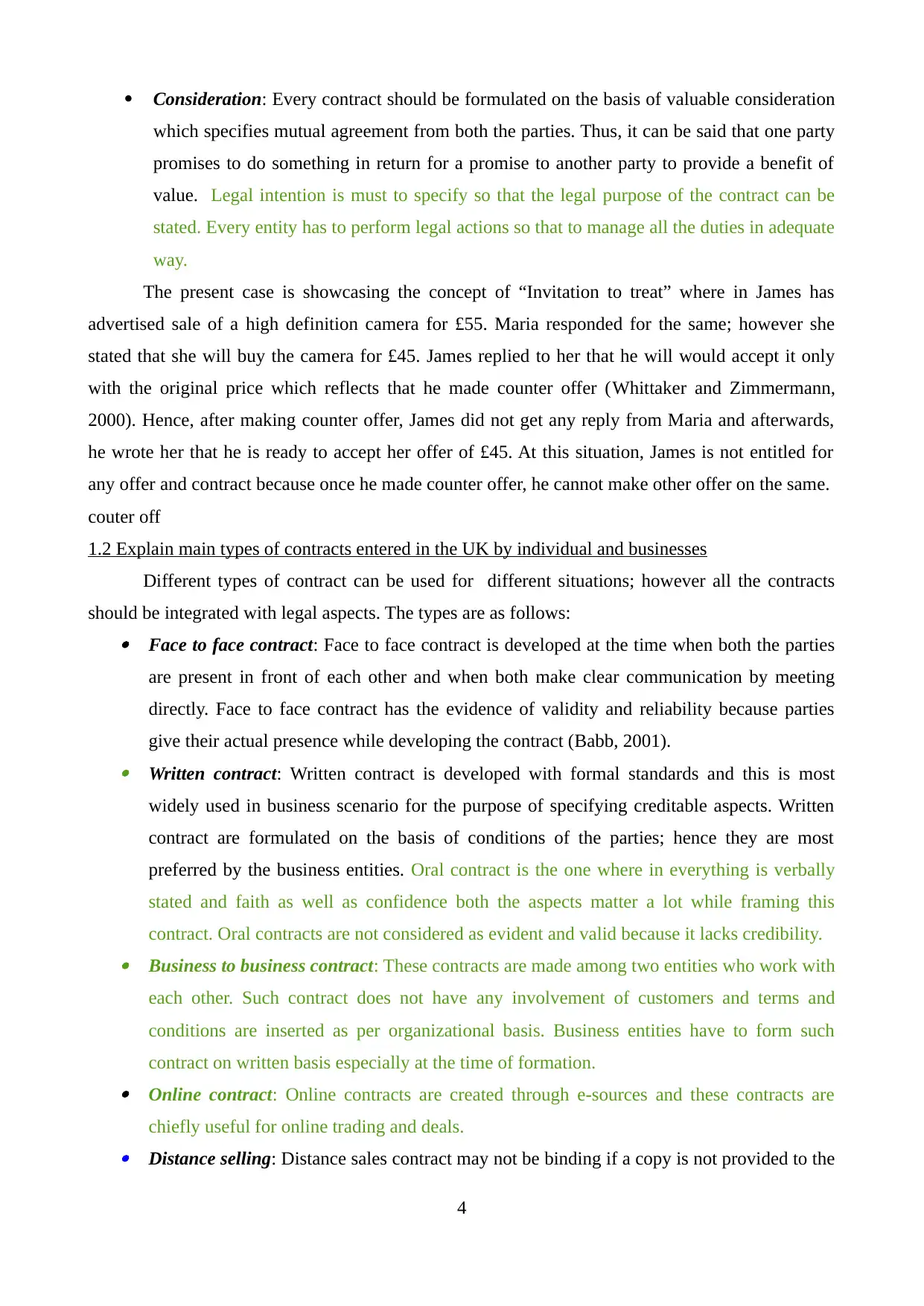
Consideration: Every contract should be formulated on the basis of valuable consideration
which specifies mutual agreement from both the parties. Thus, it can be said that one party
promises to do something in return for a promise to another party to provide a benefit of
value. Legal intention is must to specify so that the legal purpose of the contract can be
stated. Every entity has to perform legal actions so that to manage all the duties in adequate
way.
The present case is showcasing the concept of “Invitation to treat” where in James has
advertised sale of a high definition camera for £55. Maria responded for the same; however she
stated that she will buy the camera for £45. James replied to her that he will would accept it only
with the original price which reflects that he made counter offer (Whittaker and Zimmermann,
2000). Hence, after making counter offer, James did not get any reply from Maria and afterwards,
he wrote her that he is ready to accept her offer of £45. At this situation, James is not entitled for
any offer and contract because once he made counter offer, he cannot make other offer on the same.
couter off
1.2 Explain main types of contracts entered in the UK by individual and businesses
Different types of contract can be used for different situations; however all the contracts
should be integrated with legal aspects. The types are as follows: Face to face contract: Face to face contract is developed at the time when both the parties
are present in front of each other and when both make clear communication by meeting
directly. Face to face contract has the evidence of validity and reliability because parties
give their actual presence while developing the contract (Babb, 2001). Written contract: Written contract is developed with formal standards and this is most
widely used in business scenario for the purpose of specifying creditable aspects. Written
contract are formulated on the basis of conditions of the parties; hence they are most
preferred by the business entities. Oral contract is the one where in everything is verbally
stated and faith as well as confidence both the aspects matter a lot while framing this
contract. Oral contracts are not considered as evident and valid because it lacks credibility. Business to business contract: These contracts are made among two entities who work with
each other. Such contract does not have any involvement of customers and terms and
conditions are inserted as per organizational basis. Business entities have to form such
contract on written basis especially at the time of formation. Online contract: Online contracts are created through e-sources and these contracts are
chiefly useful for online trading and deals. Distance selling: Distance sales contract may not be binding if a copy is not provided to the
4
which specifies mutual agreement from both the parties. Thus, it can be said that one party
promises to do something in return for a promise to another party to provide a benefit of
value. Legal intention is must to specify so that the legal purpose of the contract can be
stated. Every entity has to perform legal actions so that to manage all the duties in adequate
way.
The present case is showcasing the concept of “Invitation to treat” where in James has
advertised sale of a high definition camera for £55. Maria responded for the same; however she
stated that she will buy the camera for £45. James replied to her that he will would accept it only
with the original price which reflects that he made counter offer (Whittaker and Zimmermann,
2000). Hence, after making counter offer, James did not get any reply from Maria and afterwards,
he wrote her that he is ready to accept her offer of £45. At this situation, James is not entitled for
any offer and contract because once he made counter offer, he cannot make other offer on the same.
couter off
1.2 Explain main types of contracts entered in the UK by individual and businesses
Different types of contract can be used for different situations; however all the contracts
should be integrated with legal aspects. The types are as follows: Face to face contract: Face to face contract is developed at the time when both the parties
are present in front of each other and when both make clear communication by meeting
directly. Face to face contract has the evidence of validity and reliability because parties
give their actual presence while developing the contract (Babb, 2001). Written contract: Written contract is developed with formal standards and this is most
widely used in business scenario for the purpose of specifying creditable aspects. Written
contract are formulated on the basis of conditions of the parties; hence they are most
preferred by the business entities. Oral contract is the one where in everything is verbally
stated and faith as well as confidence both the aspects matter a lot while framing this
contract. Oral contracts are not considered as evident and valid because it lacks credibility. Business to business contract: These contracts are made among two entities who work with
each other. Such contract does not have any involvement of customers and terms and
conditions are inserted as per organizational basis. Business entities have to form such
contract on written basis especially at the time of formation. Online contract: Online contracts are created through e-sources and these contracts are
chiefly useful for online trading and deals. Distance selling: Distance sales contract may not be binding if a copy is not provided to the
4
Paraphrase This Document
Need a fresh take? Get an instant paraphrase of this document with our AI Paraphraser
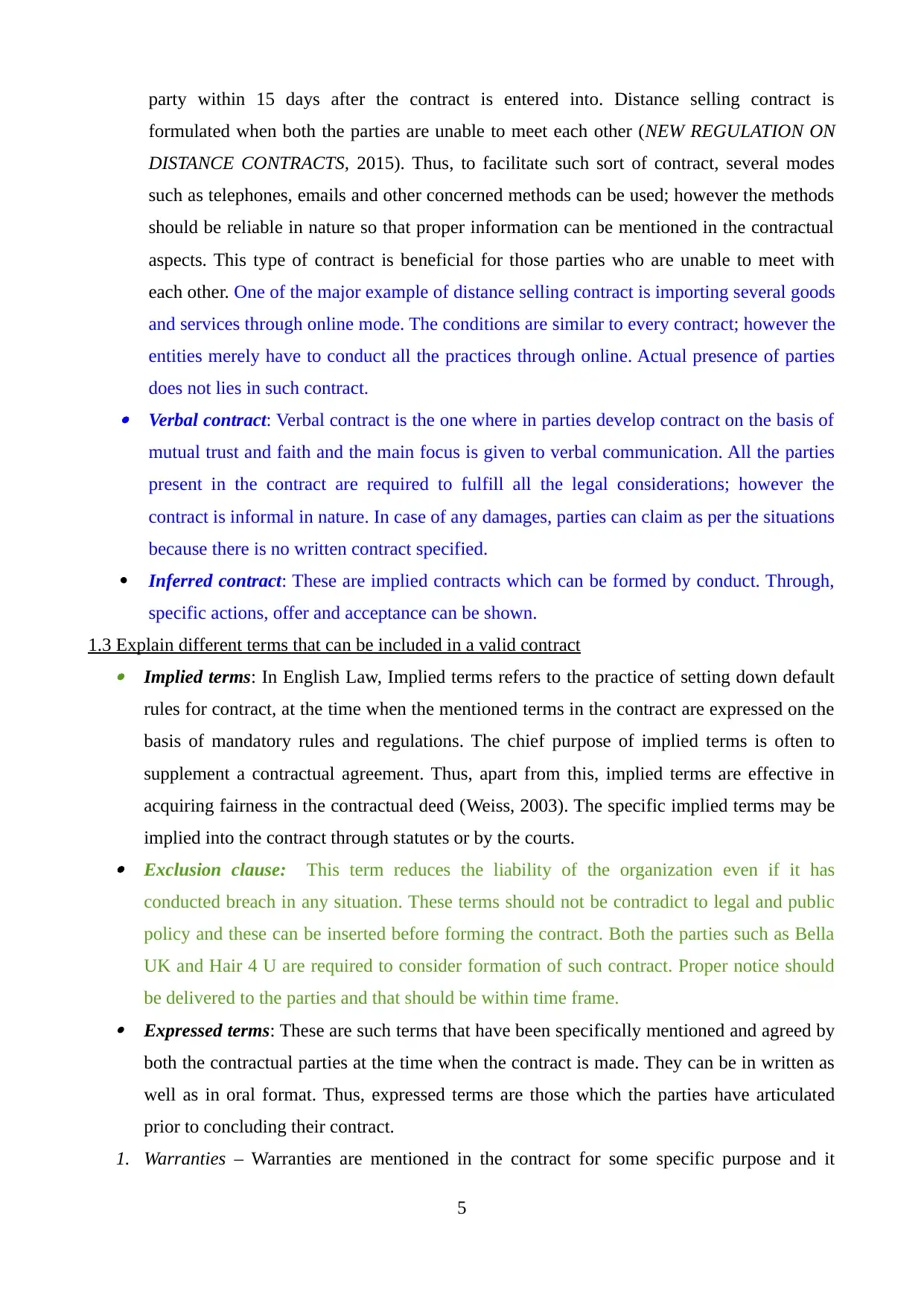
party within 15 days after the contract is entered into. Distance selling contract is
formulated when both the parties are unable to meet each other (NEW REGULATION ON
DISTANCE CONTRACTS, 2015). Thus, to facilitate such sort of contract, several modes
such as telephones, emails and other concerned methods can be used; however the methods
should be reliable in nature so that proper information can be mentioned in the contractual
aspects. This type of contract is beneficial for those parties who are unable to meet with
each other. One of the major example of distance selling contract is importing several goods
and services through online mode. The conditions are similar to every contract; however the
entities merely have to conduct all the practices through online. Actual presence of parties
does not lies in such contract. Verbal contract: Verbal contract is the one where in parties develop contract on the basis of
mutual trust and faith and the main focus is given to verbal communication. All the parties
present in the contract are required to fulfill all the legal considerations; however the
contract is informal in nature. In case of any damages, parties can claim as per the situations
because there is no written contract specified.
Inferred contract: These are implied contracts which can be formed by conduct. Through,
specific actions, offer and acceptance can be shown.
1.3 Explain different terms that can be included in a valid contract Implied terms: In English Law, Implied terms refers to the practice of setting down default
rules for contract, at the time when the mentioned terms in the contract are expressed on the
basis of mandatory rules and regulations. The chief purpose of implied terms is often to
supplement a contractual agreement. Thus, apart from this, implied terms are effective in
acquiring fairness in the contractual deed (Weiss, 2003). The specific implied terms may be
implied into the contract through statutes or by the courts. Exclusion clause: This term reduces the liability of the organization even if it has
conducted breach in any situation. These terms should not be contradict to legal and public
policy and these can be inserted before forming the contract. Both the parties such as Bella
UK and Hair 4 U are required to consider formation of such contract. Proper notice should
be delivered to the parties and that should be within time frame. Expressed terms: These are such terms that have been specifically mentioned and agreed by
both the contractual parties at the time when the contract is made. They can be in written as
well as in oral format. Thus, expressed terms are those which the parties have articulated
prior to concluding their contract.
1. Warranties – Warranties are mentioned in the contract for some specific purpose and it
5
formulated when both the parties are unable to meet each other (NEW REGULATION ON
DISTANCE CONTRACTS, 2015). Thus, to facilitate such sort of contract, several modes
such as telephones, emails and other concerned methods can be used; however the methods
should be reliable in nature so that proper information can be mentioned in the contractual
aspects. This type of contract is beneficial for those parties who are unable to meet with
each other. One of the major example of distance selling contract is importing several goods
and services through online mode. The conditions are similar to every contract; however the
entities merely have to conduct all the practices through online. Actual presence of parties
does not lies in such contract. Verbal contract: Verbal contract is the one where in parties develop contract on the basis of
mutual trust and faith and the main focus is given to verbal communication. All the parties
present in the contract are required to fulfill all the legal considerations; however the
contract is informal in nature. In case of any damages, parties can claim as per the situations
because there is no written contract specified.
Inferred contract: These are implied contracts which can be formed by conduct. Through,
specific actions, offer and acceptance can be shown.
1.3 Explain different terms that can be included in a valid contract Implied terms: In English Law, Implied terms refers to the practice of setting down default
rules for contract, at the time when the mentioned terms in the contract are expressed on the
basis of mandatory rules and regulations. The chief purpose of implied terms is often to
supplement a contractual agreement. Thus, apart from this, implied terms are effective in
acquiring fairness in the contractual deed (Weiss, 2003). The specific implied terms may be
implied into the contract through statutes or by the courts. Exclusion clause: This term reduces the liability of the organization even if it has
conducted breach in any situation. These terms should not be contradict to legal and public
policy and these can be inserted before forming the contract. Both the parties such as Bella
UK and Hair 4 U are required to consider formation of such contract. Proper notice should
be delivered to the parties and that should be within time frame. Expressed terms: These are such terms that have been specifically mentioned and agreed by
both the contractual parties at the time when the contract is made. They can be in written as
well as in oral format. Thus, expressed terms are those which the parties have articulated
prior to concluding their contract.
1. Warranties – Warranties are mentioned in the contract for some specific purpose and it
5
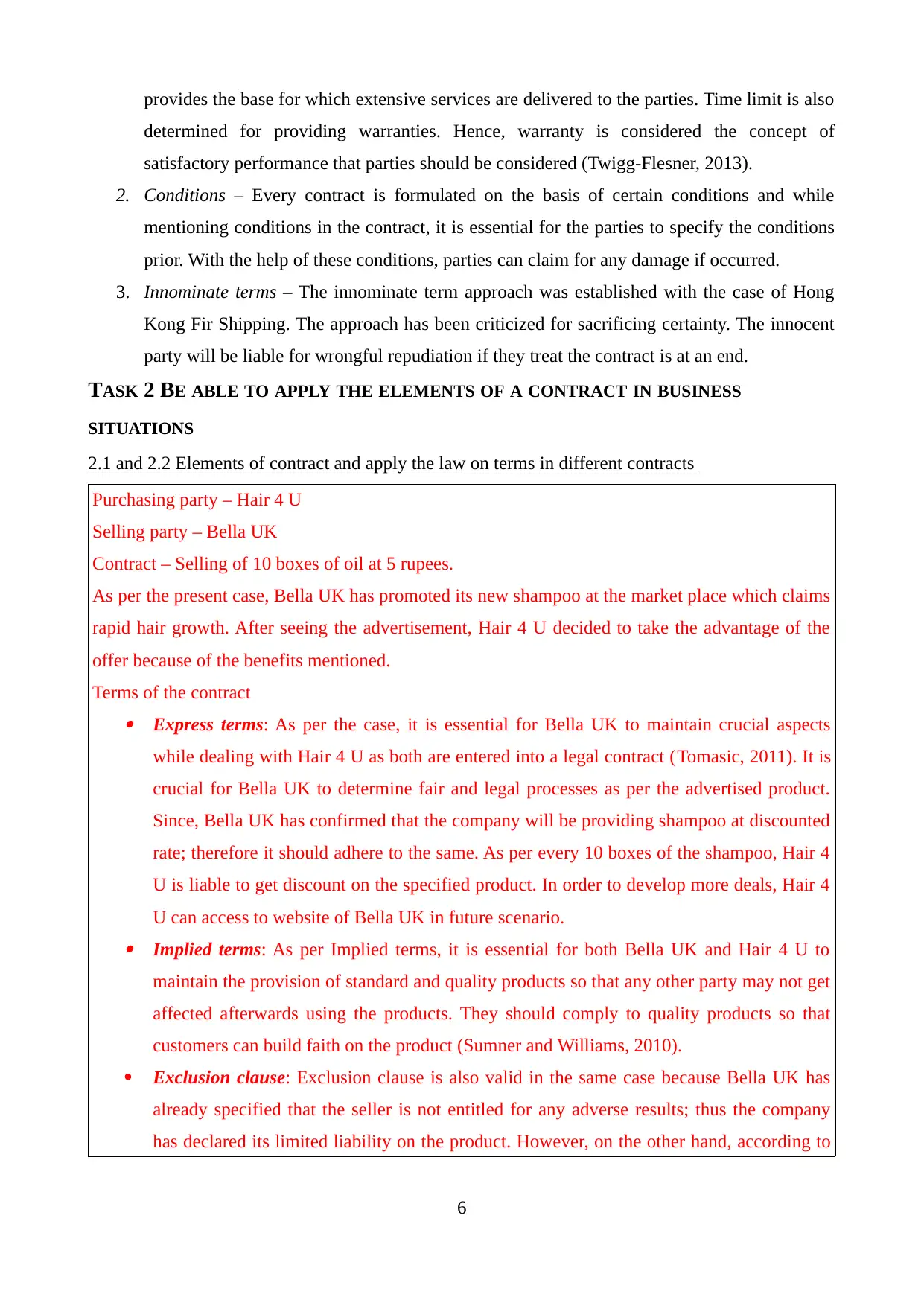
provides the base for which extensive services are delivered to the parties. Time limit is also
determined for providing warranties. Hence, warranty is considered the concept of
satisfactory performance that parties should be considered (Twigg-Flesner, 2013).
2. Conditions – Every contract is formulated on the basis of certain conditions and while
mentioning conditions in the contract, it is essential for the parties to specify the conditions
prior. With the help of these conditions, parties can claim for any damage if occurred.
3. Innominate terms – The innominate term approach was established with the case of Hong
Kong Fir Shipping. The approach has been criticized for sacrificing certainty. The innocent
party will be liable for wrongful repudiation if they treat the contract is at an end.
TASK 2 BE ABLE TO APPLY THE ELEMENTS OF A CONTRACT IN BUSINESS
SITUATIONS
2.1 and 2.2 Elements of contract and apply the law on terms in different contracts
Purchasing party – Hair 4 U
Selling party – Bella UK
Contract – Selling of 10 boxes of oil at 5 rupees.
As per the present case, Bella UK has promoted its new shampoo at the market place which claims
rapid hair growth. After seeing the advertisement, Hair 4 U decided to take the advantage of the
offer because of the benefits mentioned.
Terms of the contract Express terms: As per the case, it is essential for Bella UK to maintain crucial aspects
while dealing with Hair 4 U as both are entered into a legal contract (Tomasic, 2011). It is
crucial for Bella UK to determine fair and legal processes as per the advertised product.
Since, Bella UK has confirmed that the company will be providing shampoo at discounted
rate; therefore it should adhere to the same. As per every 10 boxes of the shampoo, Hair 4
U is liable to get discount on the specified product. In order to develop more deals, Hair 4
U can access to website of Bella UK in future scenario. Implied terms: As per Implied terms, it is essential for both Bella UK and Hair 4 U to
maintain the provision of standard and quality products so that any other party may not get
affected afterwards using the products. They should comply to quality products so that
customers can build faith on the product (Sumner and Williams, 2010).
Exclusion clause: Exclusion clause is also valid in the same case because Bella UK has
already specified that the seller is not entitled for any adverse results; thus the company
has declared its limited liability on the product. However, on the other hand, according to
6
determined for providing warranties. Hence, warranty is considered the concept of
satisfactory performance that parties should be considered (Twigg-Flesner, 2013).
2. Conditions – Every contract is formulated on the basis of certain conditions and while
mentioning conditions in the contract, it is essential for the parties to specify the conditions
prior. With the help of these conditions, parties can claim for any damage if occurred.
3. Innominate terms – The innominate term approach was established with the case of Hong
Kong Fir Shipping. The approach has been criticized for sacrificing certainty. The innocent
party will be liable for wrongful repudiation if they treat the contract is at an end.
TASK 2 BE ABLE TO APPLY THE ELEMENTS OF A CONTRACT IN BUSINESS
SITUATIONS
2.1 and 2.2 Elements of contract and apply the law on terms in different contracts
Purchasing party – Hair 4 U
Selling party – Bella UK
Contract – Selling of 10 boxes of oil at 5 rupees.
As per the present case, Bella UK has promoted its new shampoo at the market place which claims
rapid hair growth. After seeing the advertisement, Hair 4 U decided to take the advantage of the
offer because of the benefits mentioned.
Terms of the contract Express terms: As per the case, it is essential for Bella UK to maintain crucial aspects
while dealing with Hair 4 U as both are entered into a legal contract (Tomasic, 2011). It is
crucial for Bella UK to determine fair and legal processes as per the advertised product.
Since, Bella UK has confirmed that the company will be providing shampoo at discounted
rate; therefore it should adhere to the same. As per every 10 boxes of the shampoo, Hair 4
U is liable to get discount on the specified product. In order to develop more deals, Hair 4
U can access to website of Bella UK in future scenario. Implied terms: As per Implied terms, it is essential for both Bella UK and Hair 4 U to
maintain the provision of standard and quality products so that any other party may not get
affected afterwards using the products. They should comply to quality products so that
customers can build faith on the product (Sumner and Williams, 2010).
Exclusion clause: Exclusion clause is also valid in the same case because Bella UK has
already specified that the seller is not entitled for any adverse results; thus the company
has declared its limited liability on the product. However, on the other hand, according to
6
⊘ This is a preview!⊘
Do you want full access?
Subscribe today to unlock all pages.

Trusted by 1+ million students worldwide
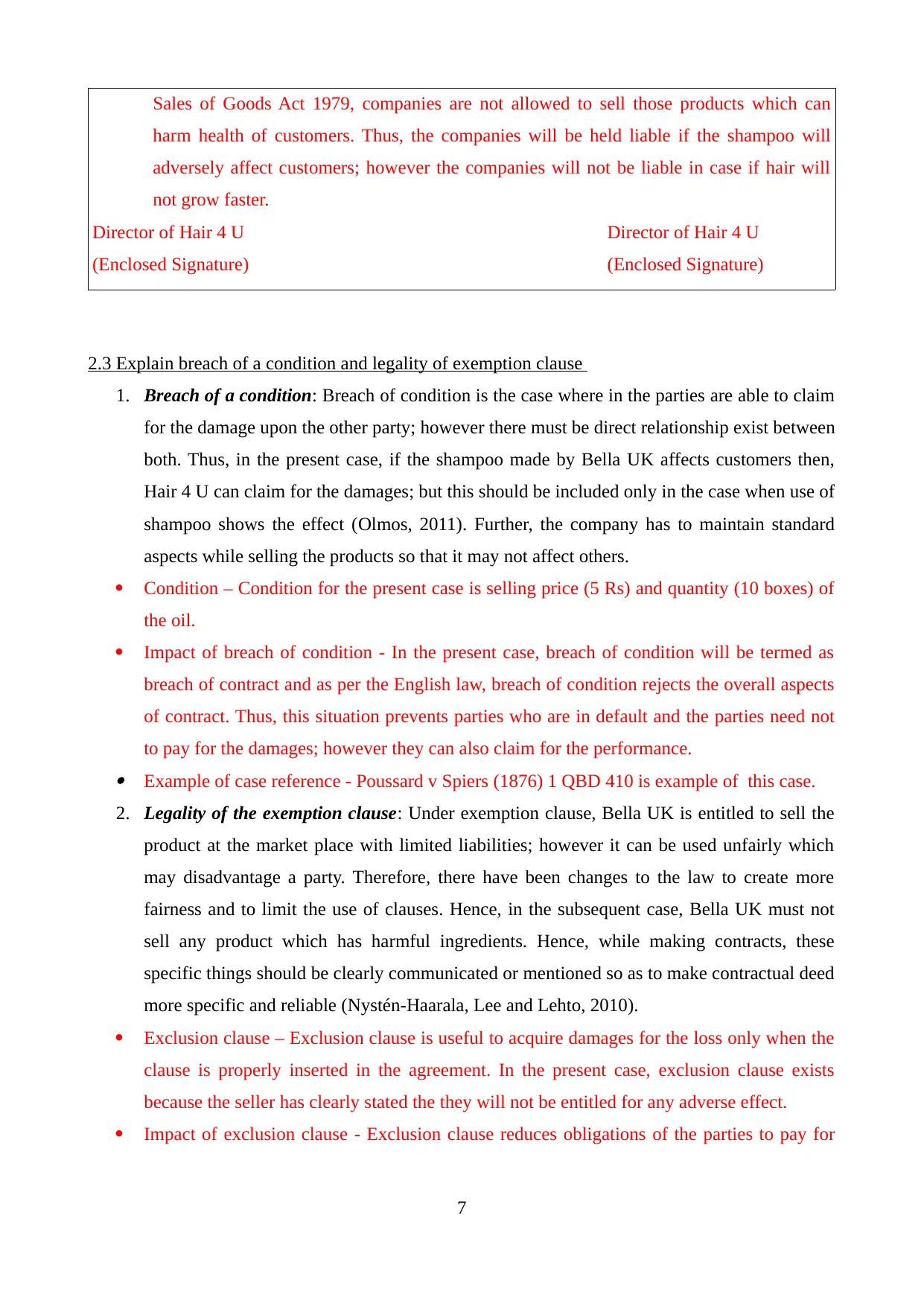
Sales of Goods Act 1979, companies are not allowed to sell those products which can
harm health of customers. Thus, the companies will be held liable if the shampoo will
adversely affect customers; however the companies will not be liable in case if hair will
not grow faster.
Director of Hair 4 U Director of Hair 4 U
(Enclosed Signature) (Enclosed Signature)
2.3 Explain breach of a condition and legality of exemption clause
1. Breach of a condition: Breach of condition is the case where in the parties are able to claim
for the damage upon the other party; however there must be direct relationship exist between
both. Thus, in the present case, if the shampoo made by Bella UK affects customers then,
Hair 4 U can claim for the damages; but this should be included only in the case when use of
shampoo shows the effect (Olmos, 2011). Further, the company has to maintain standard
aspects while selling the products so that it may not affect others.
Condition – Condition for the present case is selling price (5 Rs) and quantity (10 boxes) of
the oil.
Impact of breach of condition - In the present case, breach of condition will be termed as
breach of contract and as per the English law, breach of condition rejects the overall aspects
of contract. Thus, this situation prevents parties who are in default and the parties need not
to pay for the damages; however they can also claim for the performance. Example of case reference - Poussard v Spiers (1876) 1 QBD 410 is example of this case.
2. Legality of the exemption clause: Under exemption clause, Bella UK is entitled to sell the
product at the market place with limited liabilities; however it can be used unfairly which
may disadvantage a party. Therefore, there have been changes to the law to create more
fairness and to limit the use of clauses. Hence, in the subsequent case, Bella UK must not
sell any product which has harmful ingredients. Hence, while making contracts, these
specific things should be clearly communicated or mentioned so as to make contractual deed
more specific and reliable (Nystén-Haarala, Lee and Lehto, 2010).
Exclusion clause – Exclusion clause is useful to acquire damages for the loss only when the
clause is properly inserted in the agreement. In the present case, exclusion clause exists
because the seller has clearly stated the they will not be entitled for any adverse effect.
Impact of exclusion clause - Exclusion clause reduces obligations of the parties to pay for
7
harm health of customers. Thus, the companies will be held liable if the shampoo will
adversely affect customers; however the companies will not be liable in case if hair will
not grow faster.
Director of Hair 4 U Director of Hair 4 U
(Enclosed Signature) (Enclosed Signature)
2.3 Explain breach of a condition and legality of exemption clause
1. Breach of a condition: Breach of condition is the case where in the parties are able to claim
for the damage upon the other party; however there must be direct relationship exist between
both. Thus, in the present case, if the shampoo made by Bella UK affects customers then,
Hair 4 U can claim for the damages; but this should be included only in the case when use of
shampoo shows the effect (Olmos, 2011). Further, the company has to maintain standard
aspects while selling the products so that it may not affect others.
Condition – Condition for the present case is selling price (5 Rs) and quantity (10 boxes) of
the oil.
Impact of breach of condition - In the present case, breach of condition will be termed as
breach of contract and as per the English law, breach of condition rejects the overall aspects
of contract. Thus, this situation prevents parties who are in default and the parties need not
to pay for the damages; however they can also claim for the performance. Example of case reference - Poussard v Spiers (1876) 1 QBD 410 is example of this case.
2. Legality of the exemption clause: Under exemption clause, Bella UK is entitled to sell the
product at the market place with limited liabilities; however it can be used unfairly which
may disadvantage a party. Therefore, there have been changes to the law to create more
fairness and to limit the use of clauses. Hence, in the subsequent case, Bella UK must not
sell any product which has harmful ingredients. Hence, while making contracts, these
specific things should be clearly communicated or mentioned so as to make contractual deed
more specific and reliable (Nystén-Haarala, Lee and Lehto, 2010).
Exclusion clause – Exclusion clause is useful to acquire damages for the loss only when the
clause is properly inserted in the agreement. In the present case, exclusion clause exists
because the seller has clearly stated the they will not be entitled for any adverse effect.
Impact of exclusion clause - Exclusion clause reduces obligations of the parties to pay for
7
Paraphrase This Document
Need a fresh take? Get an instant paraphrase of this document with our AI Paraphraser
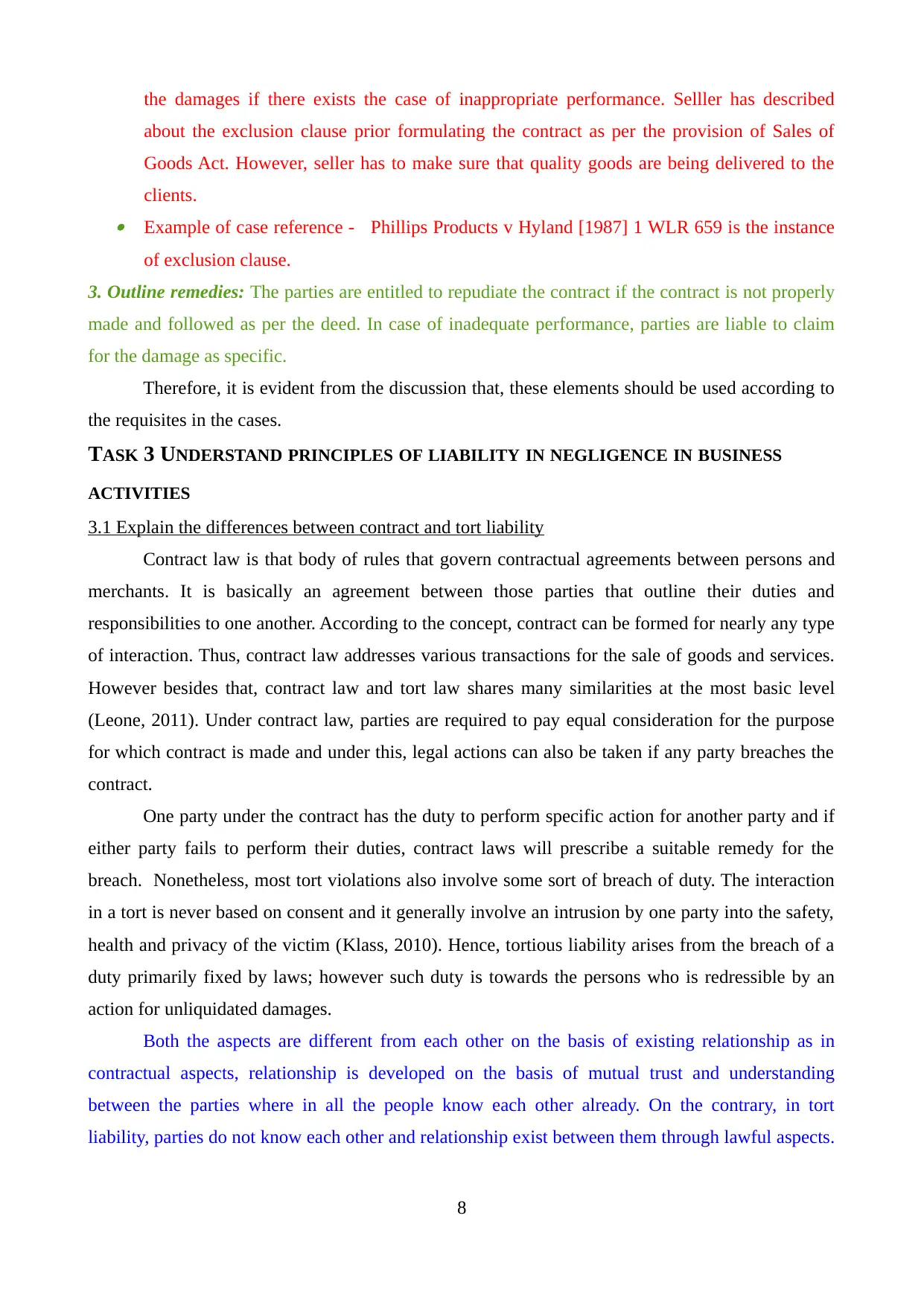
the damages if there exists the case of inappropriate performance. Selller has described
about the exclusion clause prior formulating the contract as per the provision of Sales of
Goods Act. However, seller has to make sure that quality goods are being delivered to the
clients. Example of case reference - Phillips Products v Hyland [1987] 1 WLR 659 is the instance
of exclusion clause.
3. Outline remedies: The parties are entitled to repudiate the contract if the contract is not properly
made and followed as per the deed. In case of inadequate performance, parties are liable to claim
for the damage as specific.
Therefore, it is evident from the discussion that, these elements should be used according to
the requisites in the cases.
TASK 3 UNDERSTAND PRINCIPLES OF LIABILITY IN NEGLIGENCE IN BUSINESS
ACTIVITIES
3.1 Explain the differences between contract and tort liability
Contract law is that body of rules that govern contractual agreements between persons and
merchants. It is basically an agreement between those parties that outline their duties and
responsibilities to one another. According to the concept, contract can be formed for nearly any type
of interaction. Thus, contract law addresses various transactions for the sale of goods and services.
However besides that, contract law and tort law shares many similarities at the most basic level
(Leone, 2011). Under contract law, parties are required to pay equal consideration for the purpose
for which contract is made and under this, legal actions can also be taken if any party breaches the
contract.
One party under the contract has the duty to perform specific action for another party and if
either party fails to perform their duties, contract laws will prescribe a suitable remedy for the
breach. Nonetheless, most tort violations also involve some sort of breach of duty. The interaction
in a tort is never based on consent and it generally involve an intrusion by one party into the safety,
health and privacy of the victim (Klass, 2010). Hence, tortious liability arises from the breach of a
duty primarily fixed by laws; however such duty is towards the persons who is redressible by an
action for unliquidated damages.
Both the aspects are different from each other on the basis of existing relationship as in
contractual aspects, relationship is developed on the basis of mutual trust and understanding
between the parties where in all the people know each other already. On the contrary, in tort
liability, parties do not know each other and relationship exist between them through lawful aspects.
8
about the exclusion clause prior formulating the contract as per the provision of Sales of
Goods Act. However, seller has to make sure that quality goods are being delivered to the
clients. Example of case reference - Phillips Products v Hyland [1987] 1 WLR 659 is the instance
of exclusion clause.
3. Outline remedies: The parties are entitled to repudiate the contract if the contract is not properly
made and followed as per the deed. In case of inadequate performance, parties are liable to claim
for the damage as specific.
Therefore, it is evident from the discussion that, these elements should be used according to
the requisites in the cases.
TASK 3 UNDERSTAND PRINCIPLES OF LIABILITY IN NEGLIGENCE IN BUSINESS
ACTIVITIES
3.1 Explain the differences between contract and tort liability
Contract law is that body of rules that govern contractual agreements between persons and
merchants. It is basically an agreement between those parties that outline their duties and
responsibilities to one another. According to the concept, contract can be formed for nearly any type
of interaction. Thus, contract law addresses various transactions for the sale of goods and services.
However besides that, contract law and tort law shares many similarities at the most basic level
(Leone, 2011). Under contract law, parties are required to pay equal consideration for the purpose
for which contract is made and under this, legal actions can also be taken if any party breaches the
contract.
One party under the contract has the duty to perform specific action for another party and if
either party fails to perform their duties, contract laws will prescribe a suitable remedy for the
breach. Nonetheless, most tort violations also involve some sort of breach of duty. The interaction
in a tort is never based on consent and it generally involve an intrusion by one party into the safety,
health and privacy of the victim (Klass, 2010). Hence, tortious liability arises from the breach of a
duty primarily fixed by laws; however such duty is towards the persons who is redressible by an
action for unliquidated damages.
Both the aspects are different from each other on the basis of existing relationship as in
contractual aspects, relationship is developed on the basis of mutual trust and understanding
between the parties where in all the people know each other already. On the contrary, in tort
liability, parties do not know each other and relationship exist between them through lawful aspects.
8
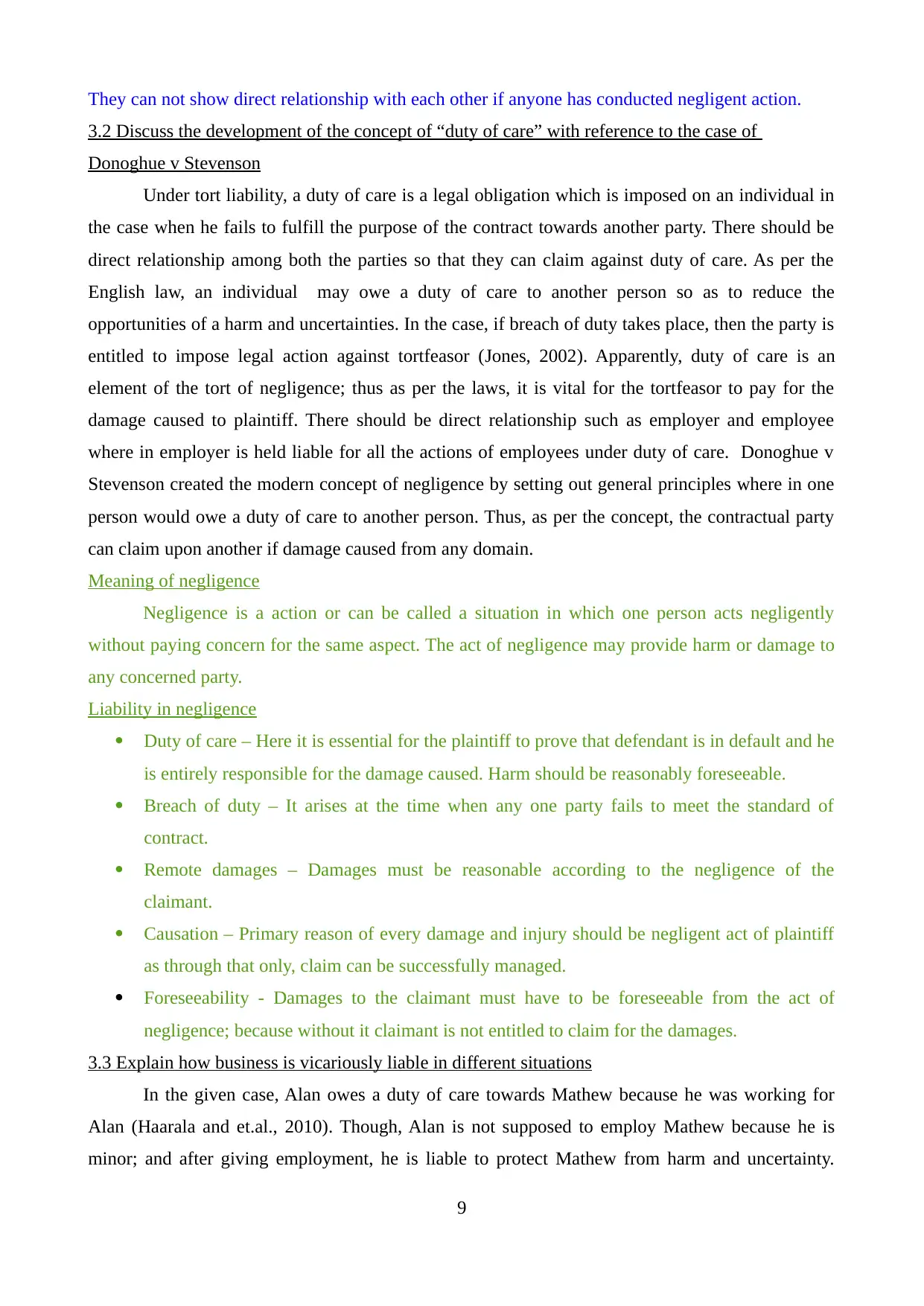
They can not show direct relationship with each other if anyone has conducted negligent action.
3.2 Discuss the development of the concept of “duty of care” with reference to the case of
Donoghue v Stevenson
Under tort liability, a duty of care is a legal obligation which is imposed on an individual in
the case when he fails to fulfill the purpose of the contract towards another party. There should be
direct relationship among both the parties so that they can claim against duty of care. As per the
English law, an individual may owe a duty of care to another person so as to reduce the
opportunities of a harm and uncertainties. In the case, if breach of duty takes place, then the party is
entitled to impose legal action against tortfeasor (Jones, 2002). Apparently, duty of care is an
element of the tort of negligence; thus as per the laws, it is vital for the tortfeasor to pay for the
damage caused to plaintiff. There should be direct relationship such as employer and employee
where in employer is held liable for all the actions of employees under duty of care. Donoghue v
Stevenson created the modern concept of negligence by setting out general principles where in one
person would owe a duty of care to another person. Thus, as per the concept, the contractual party
can claim upon another if damage caused from any domain.
Meaning of negligence
Negligence is a action or can be called a situation in which one person acts negligently
without paying concern for the same aspect. The act of negligence may provide harm or damage to
any concerned party.
Liability in negligence
Duty of care – Here it is essential for the plaintiff to prove that defendant is in default and he
is entirely responsible for the damage caused. Harm should be reasonably foreseeable.
Breach of duty – It arises at the time when any one party fails to meet the standard of
contract.
Remote damages – Damages must be reasonable according to the negligence of the
claimant.
Causation – Primary reason of every damage and injury should be negligent act of plaintiff
as through that only, claim can be successfully managed.
Foreseeability - Damages to the claimant must have to be foreseeable from the act of
negligence; because without it claimant is not entitled to claim for the damages.
3.3 Explain how business is vicariously liable in different situations
In the given case, Alan owes a duty of care towards Mathew because he was working for
Alan (Haarala and et.al., 2010). Though, Alan is not supposed to employ Mathew because he is
minor; and after giving employment, he is liable to protect Mathew from harm and uncertainty.
9
3.2 Discuss the development of the concept of “duty of care” with reference to the case of
Donoghue v Stevenson
Under tort liability, a duty of care is a legal obligation which is imposed on an individual in
the case when he fails to fulfill the purpose of the contract towards another party. There should be
direct relationship among both the parties so that they can claim against duty of care. As per the
English law, an individual may owe a duty of care to another person so as to reduce the
opportunities of a harm and uncertainties. In the case, if breach of duty takes place, then the party is
entitled to impose legal action against tortfeasor (Jones, 2002). Apparently, duty of care is an
element of the tort of negligence; thus as per the laws, it is vital for the tortfeasor to pay for the
damage caused to plaintiff. There should be direct relationship such as employer and employee
where in employer is held liable for all the actions of employees under duty of care. Donoghue v
Stevenson created the modern concept of negligence by setting out general principles where in one
person would owe a duty of care to another person. Thus, as per the concept, the contractual party
can claim upon another if damage caused from any domain.
Meaning of negligence
Negligence is a action or can be called a situation in which one person acts negligently
without paying concern for the same aspect. The act of negligence may provide harm or damage to
any concerned party.
Liability in negligence
Duty of care – Here it is essential for the plaintiff to prove that defendant is in default and he
is entirely responsible for the damage caused. Harm should be reasonably foreseeable.
Breach of duty – It arises at the time when any one party fails to meet the standard of
contract.
Remote damages – Damages must be reasonable according to the negligence of the
claimant.
Causation – Primary reason of every damage and injury should be negligent act of plaintiff
as through that only, claim can be successfully managed.
Foreseeability - Damages to the claimant must have to be foreseeable from the act of
negligence; because without it claimant is not entitled to claim for the damages.
3.3 Explain how business is vicariously liable in different situations
In the given case, Alan owes a duty of care towards Mathew because he was working for
Alan (Haarala and et.al., 2010). Though, Alan is not supposed to employ Mathew because he is
minor; and after giving employment, he is liable to protect Mathew from harm and uncertainty.
9
⊘ This is a preview!⊘
Do you want full access?
Subscribe today to unlock all pages.

Trusted by 1+ million students worldwide
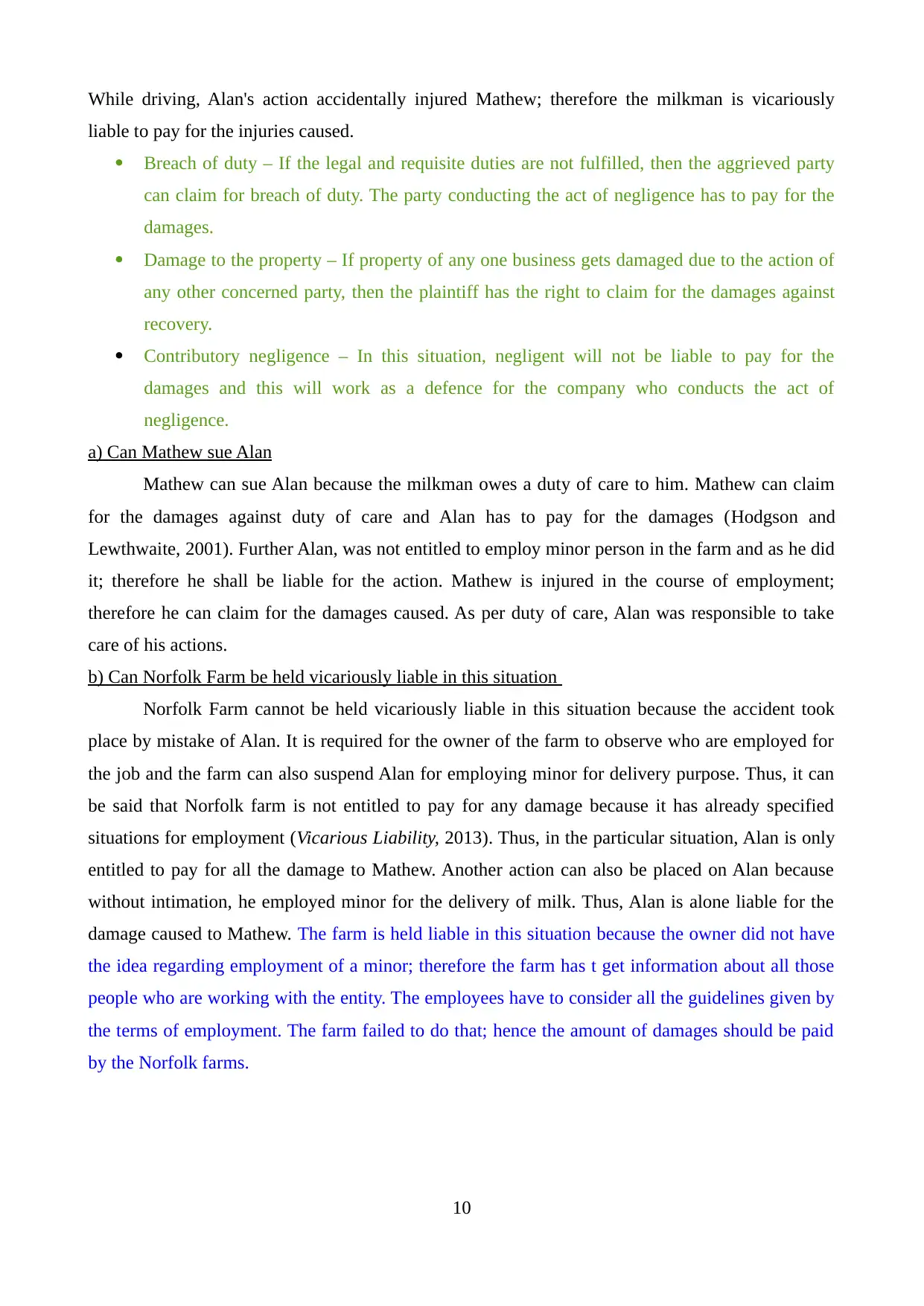
While driving, Alan's action accidentally injured Mathew; therefore the milkman is vicariously
liable to pay for the injuries caused.
Breach of duty – If the legal and requisite duties are not fulfilled, then the aggrieved party
can claim for breach of duty. The party conducting the act of negligence has to pay for the
damages.
Damage to the property – If property of any one business gets damaged due to the action of
any other concerned party, then the plaintiff has the right to claim for the damages against
recovery.
Contributory negligence – In this situation, negligent will not be liable to pay for the
damages and this will work as a defence for the company who conducts the act of
negligence.
a) Can Mathew sue Alan
Mathew can sue Alan because the milkman owes a duty of care to him. Mathew can claim
for the damages against duty of care and Alan has to pay for the damages (Hodgson and
Lewthwaite, 2001). Further Alan, was not entitled to employ minor person in the farm and as he did
it; therefore he shall be liable for the action. Mathew is injured in the course of employment;
therefore he can claim for the damages caused. As per duty of care, Alan was responsible to take
care of his actions.
b) Can Norfolk Farm be held vicariously liable in this situation
Norfolk Farm cannot be held vicariously liable in this situation because the accident took
place by mistake of Alan. It is required for the owner of the farm to observe who are employed for
the job and the farm can also suspend Alan for employing minor for delivery purpose. Thus, it can
be said that Norfolk farm is not entitled to pay for any damage because it has already specified
situations for employment (Vicarious Liability, 2013). Thus, in the particular situation, Alan is only
entitled to pay for all the damage to Mathew. Another action can also be placed on Alan because
without intimation, he employed minor for the delivery of milk. Thus, Alan is alone liable for the
damage caused to Mathew. The farm is held liable in this situation because the owner did not have
the idea regarding employment of a minor; therefore the farm has t get information about all those
people who are working with the entity. The employees have to consider all the guidelines given by
the terms of employment. The farm failed to do that; hence the amount of damages should be paid
by the Norfolk farms.
10
liable to pay for the injuries caused.
Breach of duty – If the legal and requisite duties are not fulfilled, then the aggrieved party
can claim for breach of duty. The party conducting the act of negligence has to pay for the
damages.
Damage to the property – If property of any one business gets damaged due to the action of
any other concerned party, then the plaintiff has the right to claim for the damages against
recovery.
Contributory negligence – In this situation, negligent will not be liable to pay for the
damages and this will work as a defence for the company who conducts the act of
negligence.
a) Can Mathew sue Alan
Mathew can sue Alan because the milkman owes a duty of care to him. Mathew can claim
for the damages against duty of care and Alan has to pay for the damages (Hodgson and
Lewthwaite, 2001). Further Alan, was not entitled to employ minor person in the farm and as he did
it; therefore he shall be liable for the action. Mathew is injured in the course of employment;
therefore he can claim for the damages caused. As per duty of care, Alan was responsible to take
care of his actions.
b) Can Norfolk Farm be held vicariously liable in this situation
Norfolk Farm cannot be held vicariously liable in this situation because the accident took
place by mistake of Alan. It is required for the owner of the farm to observe who are employed for
the job and the farm can also suspend Alan for employing minor for delivery purpose. Thus, it can
be said that Norfolk farm is not entitled to pay for any damage because it has already specified
situations for employment (Vicarious Liability, 2013). Thus, in the particular situation, Alan is only
entitled to pay for all the damage to Mathew. Another action can also be placed on Alan because
without intimation, he employed minor for the delivery of milk. Thus, Alan is alone liable for the
damage caused to Mathew. The farm is held liable in this situation because the owner did not have
the idea regarding employment of a minor; therefore the farm has t get information about all those
people who are working with the entity. The employees have to consider all the guidelines given by
the terms of employment. The farm failed to do that; hence the amount of damages should be paid
by the Norfolk farms.
10
Paraphrase This Document
Need a fresh take? Get an instant paraphrase of this document with our AI Paraphraser
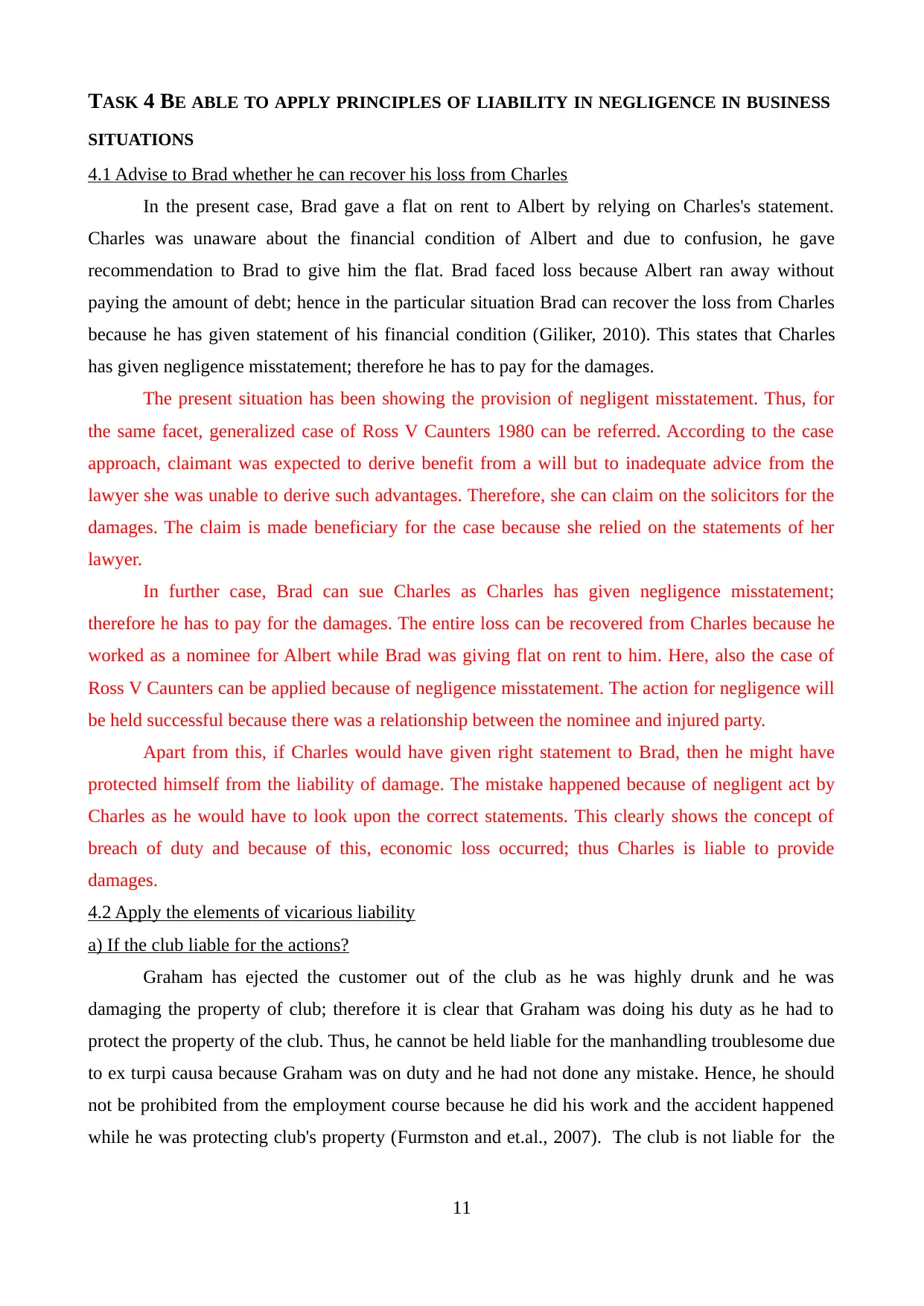
TASK 4 BE ABLE TO APPLY PRINCIPLES OF LIABILITY IN NEGLIGENCE IN BUSINESS
SITUATIONS
4.1 Advise to Brad whether he can recover his loss from Charles
In the present case, Brad gave a flat on rent to Albert by relying on Charles's statement.
Charles was unaware about the financial condition of Albert and due to confusion, he gave
recommendation to Brad to give him the flat. Brad faced loss because Albert ran away without
paying the amount of debt; hence in the particular situation Brad can recover the loss from Charles
because he has given statement of his financial condition (Giliker, 2010). This states that Charles
has given negligence misstatement; therefore he has to pay for the damages.
The present situation has been showing the provision of negligent misstatement. Thus, for
the same facet, generalized case of Ross V Caunters 1980 can be referred. According to the case
approach, claimant was expected to derive benefit from a will but to inadequate advice from the
lawyer she was unable to derive such advantages. Therefore, she can claim on the solicitors for the
damages. The claim is made beneficiary for the case because she relied on the statements of her
lawyer.
In further case, Brad can sue Charles as Charles has given negligence misstatement;
therefore he has to pay for the damages. The entire loss can be recovered from Charles because he
worked as a nominee for Albert while Brad was giving flat on rent to him. Here, also the case of
Ross V Caunters can be applied because of negligence misstatement. The action for negligence will
be held successful because there was a relationship between the nominee and injured party.
Apart from this, if Charles would have given right statement to Brad, then he might have
protected himself from the liability of damage. The mistake happened because of negligent act by
Charles as he would have to look upon the correct statements. This clearly shows the concept of
breach of duty and because of this, economic loss occurred; thus Charles is liable to provide
damages.
4.2 Apply the elements of vicarious liability
a) If the club liable for the actions?
Graham has ejected the customer out of the club as he was highly drunk and he was
damaging the property of club; therefore it is clear that Graham was doing his duty as he had to
protect the property of the club. Thus, he cannot be held liable for the manhandling troublesome due
to ex turpi causa because Graham was on duty and he had not done any mistake. Hence, he should
not be prohibited from the employment course because he did his work and the accident happened
while he was protecting club's property (Furmston and et.al., 2007). The club is not liable for the
11
SITUATIONS
4.1 Advise to Brad whether he can recover his loss from Charles
In the present case, Brad gave a flat on rent to Albert by relying on Charles's statement.
Charles was unaware about the financial condition of Albert and due to confusion, he gave
recommendation to Brad to give him the flat. Brad faced loss because Albert ran away without
paying the amount of debt; hence in the particular situation Brad can recover the loss from Charles
because he has given statement of his financial condition (Giliker, 2010). This states that Charles
has given negligence misstatement; therefore he has to pay for the damages.
The present situation has been showing the provision of negligent misstatement. Thus, for
the same facet, generalized case of Ross V Caunters 1980 can be referred. According to the case
approach, claimant was expected to derive benefit from a will but to inadequate advice from the
lawyer she was unable to derive such advantages. Therefore, she can claim on the solicitors for the
damages. The claim is made beneficiary for the case because she relied on the statements of her
lawyer.
In further case, Brad can sue Charles as Charles has given negligence misstatement;
therefore he has to pay for the damages. The entire loss can be recovered from Charles because he
worked as a nominee for Albert while Brad was giving flat on rent to him. Here, also the case of
Ross V Caunters can be applied because of negligence misstatement. The action for negligence will
be held successful because there was a relationship between the nominee and injured party.
Apart from this, if Charles would have given right statement to Brad, then he might have
protected himself from the liability of damage. The mistake happened because of negligent act by
Charles as he would have to look upon the correct statements. This clearly shows the concept of
breach of duty and because of this, economic loss occurred; thus Charles is liable to provide
damages.
4.2 Apply the elements of vicarious liability
a) If the club liable for the actions?
Graham has ejected the customer out of the club as he was highly drunk and he was
damaging the property of club; therefore it is clear that Graham was doing his duty as he had to
protect the property of the club. Thus, he cannot be held liable for the manhandling troublesome due
to ex turpi causa because Graham was on duty and he had not done any mistake. Hence, he should
not be prohibited from the employment course because he did his work and the accident happened
while he was protecting club's property (Furmston and et.al., 2007). The club is not liable for the
11
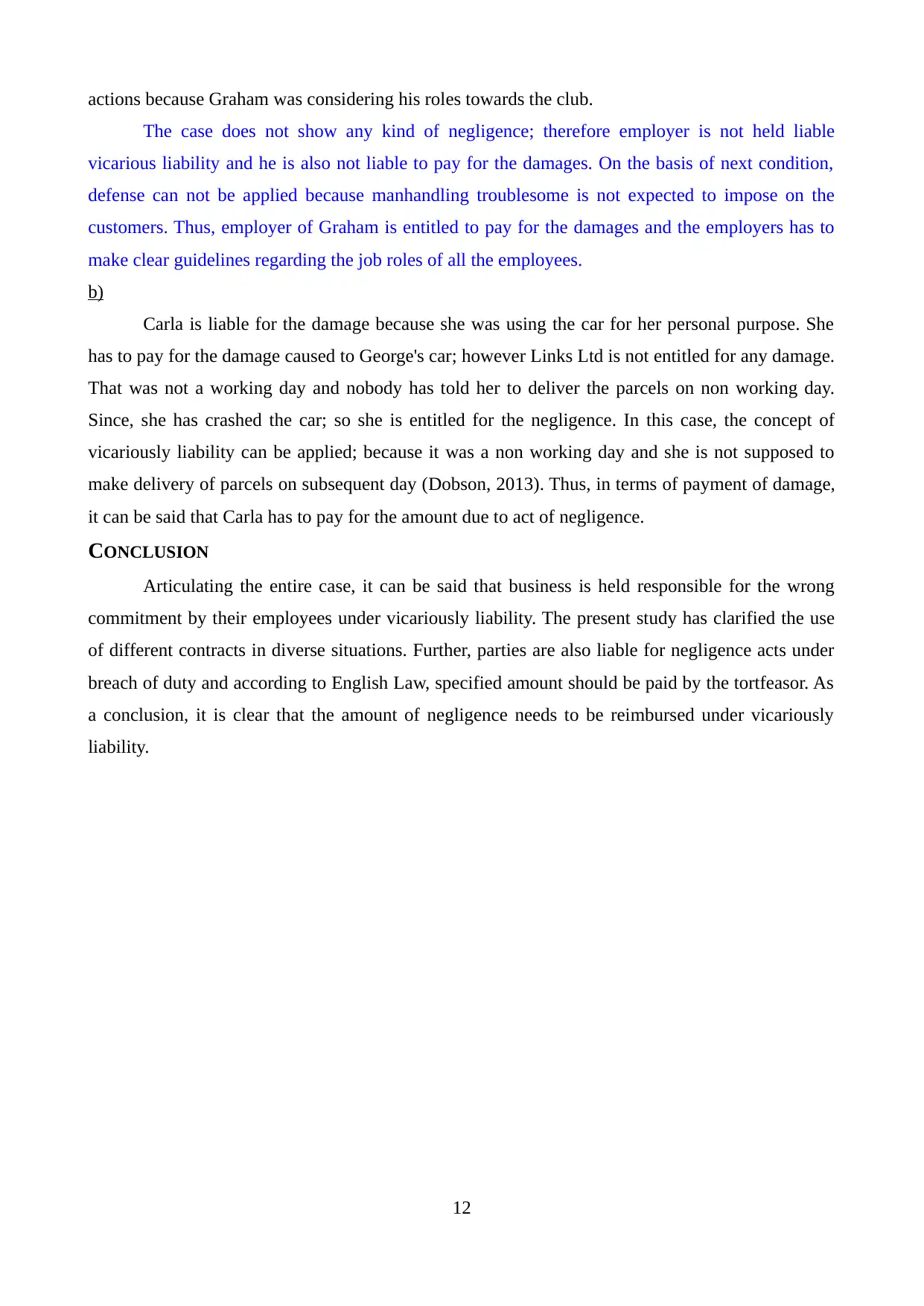
actions because Graham was considering his roles towards the club.
The case does not show any kind of negligence; therefore employer is not held liable
vicarious liability and he is also not liable to pay for the damages. On the basis of next condition,
defense can not be applied because manhandling troublesome is not expected to impose on the
customers. Thus, employer of Graham is entitled to pay for the damages and the employers has to
make clear guidelines regarding the job roles of all the employees.
b)
Carla is liable for the damage because she was using the car for her personal purpose. She
has to pay for the damage caused to George's car; however Links Ltd is not entitled for any damage.
That was not a working day and nobody has told her to deliver the parcels on non working day.
Since, she has crashed the car; so she is entitled for the negligence. In this case, the concept of
vicariously liability can be applied; because it was a non working day and she is not supposed to
make delivery of parcels on subsequent day (Dobson, 2013). Thus, in terms of payment of damage,
it can be said that Carla has to pay for the amount due to act of negligence.
CONCLUSION
Articulating the entire case, it can be said that business is held responsible for the wrong
commitment by their employees under vicariously liability. The present study has clarified the use
of different contracts in diverse situations. Further, parties are also liable for negligence acts under
breach of duty and according to English Law, specified amount should be paid by the tortfeasor. As
a conclusion, it is clear that the amount of negligence needs to be reimbursed under vicariously
liability.
12
The case does not show any kind of negligence; therefore employer is not held liable
vicarious liability and he is also not liable to pay for the damages. On the basis of next condition,
defense can not be applied because manhandling troublesome is not expected to impose on the
customers. Thus, employer of Graham is entitled to pay for the damages and the employers has to
make clear guidelines regarding the job roles of all the employees.
b)
Carla is liable for the damage because she was using the car for her personal purpose. She
has to pay for the damage caused to George's car; however Links Ltd is not entitled for any damage.
That was not a working day and nobody has told her to deliver the parcels on non working day.
Since, she has crashed the car; so she is entitled for the negligence. In this case, the concept of
vicariously liability can be applied; because it was a non working day and she is not supposed to
make delivery of parcels on subsequent day (Dobson, 2013). Thus, in terms of payment of damage,
it can be said that Carla has to pay for the amount due to act of negligence.
CONCLUSION
Articulating the entire case, it can be said that business is held responsible for the wrong
commitment by their employees under vicariously liability. The present study has clarified the use
of different contracts in diverse situations. Further, parties are also liable for negligence acts under
breach of duty and according to English Law, specified amount should be paid by the tortfeasor. As
a conclusion, it is clear that the amount of negligence needs to be reimbursed under vicariously
liability.
12
⊘ This is a preview!⊘
Do you want full access?
Subscribe today to unlock all pages.

Trusted by 1+ million students worldwide
1 out of 14
Related Documents
Your All-in-One AI-Powered Toolkit for Academic Success.
+13062052269
info@desklib.com
Available 24*7 on WhatsApp / Email
![[object Object]](/_next/static/media/star-bottom.7253800d.svg)
Unlock your academic potential
Copyright © 2020–2026 A2Z Services. All Rights Reserved. Developed and managed by ZUCOL.




